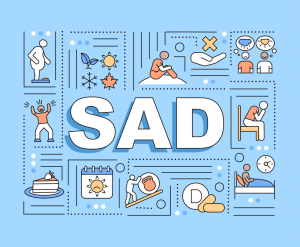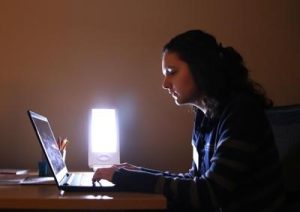The Shortest Day of the Year Doesn’t Have to Feel Like it

Winter Solstice? Winter Solitude? Winter Sadness?
Today is the shortest day of the year; the sun rose at 7:55 am and will set at 4:21 pm (with regional variations). This day is ~7 hours, 32 minutes shorter than the June Solstice.
Tis the Season! Some celebrate the Winter Solstice. Some roll these short days into their “Most Wonderful Time of the Year” song repertoire. Some have trouble getting out of bed and staying motivated. Have you noticed yourself feeling more tired, depressed, having decreased interest in work and other activities, craving sweets and starches or having an overall lack of energy? If so, you may be suffering from Seasonal Affective Disorder (SAD)?
If you are experiencing SAD, you are not alone. But you don’t have to spend the winter months feeling depressed and unmotivated. Here’s what you need to know about SAD and how to alleviate it.
What is Seasonal Affective Disorder?
We all experience internal changes as the seasons turn, but for some people it can be dramatic. Six in 100 will experience severe symptoms of SAD such as changes in mood, sleep patterns, and eating habits; lack of enjoyment; low energy; difficulty concentrating; and less time socializing. SAD goes beyond the feelings of the “winter blahs” or “cabin fever.” This condition is characterized by recurrent episodes of depression that occurs in relation to the seasons (most commonly winter) alternating with periods of normal mood the rest of the year (or, for those already managing symptoms of depression, a seasonal exacerbation of them).

We know that a positive mood is one of the largest factors to good health, and part of a positive mood comes with getting some sun. Two chemicals in the brain, melatonin (sleep) and serotonin (sense of well-being), help to regulate our sleep-wake cycles, energy levels, and mood. The levels of these two chemicals change depending on sunlight exposure.
During fall and winter, when the days are shorter and there are more hours of darkness, levels of melatonin increase and serotonin decrease. This type of weather triggers the brain and body to start our annual hibernation of sorts that happens psychologically and biologically during the fall and winter months.
SAD is correlated with these seasonal variations of light, body temperature, and hormone regulation during the colder months. It is also significantly correlated with several other risk factors:
- Seasonal lifestyle changes. If you only work during a portion of the year, have less to do during a specific time period, or face annual stress.
- Seasonal associations with previous trauma and grief. Our minds form strong connections between the sights and sounds of seasonal shifts and memories of the past.
- Cultural norms and traditions. The high of the holiday season followed by the low of the new year.
- Seasonal health issues. For example: if you have severe allergies, you may get depressed in the spring; chronic bronchitis can make the winter months depressing.
Lawyer Triple Whammy of Risks?
Attorneys in general may be more susceptible to SAD than other professionals because of our long work hours and general predisposition toward depression. Lawyers have statistically significant elevations of major depressive disorder and suffer from depression at a rate 3.6 times higher than other employed persons. See ABA/Hazeldon Study (2016).
Then the seasonal changes coupled with the high baseline of depression in the legal profession are intensified by the impact of two years of a global pandemic. A Boston University study found that during the first year of the pandemic depression rates more than tripled from their baseline. By March and April of 2021, 32 percent of Americans surveyed were experiencing depression. That’s almost a third! And we’ve had so much more to be depressed about after the study period ended as this pandemic just continues to slog on, and on, and on, with no real end in sight.
Since our “triple whammy” of climate, profession, and the global pandemic places members of the legal profession at particular risk, all attorneys should be conscious of whether they are experiencing symptoms associated with the winter blues or a more serious case of SAD.
SAD Symptoms and Impact
The typical symptoms of SAD include depression, lack of energy, increased need for sleep, a craving for sweets and weight gain. We can all experience some of these symptoms periodically, but like most things, moderation is the key. If you are experiencing these symptoms continuously over weeks or months, and these symptoms are impacting your ability to function at work or at home, it’s time to call VJLAP, a mental health professional, or your primary care physician. These symptoms may become debilitating and can have a negative impact on an attorney’s health and practice.
More specifically, those who experience seasonal affective disorder often experience the following symptoms:
- Appetite changes including increased cravings for sugary or starchy foods
- Avoidance of people or activities previously enjoyed
 Daytime fatigue
Daytime fatigue- Difficulty in concentrating
- Feeling tense or stressed
- Insomnia or sense of feeling tired all the time
- Irritability
- Lowered sex drive and desire for physical contact
- Sadness, guilt, or overly critical of one’s self
- Sense of hopelessness
- Weight gain
Resources and Treatment
The good news is that there are several treatments available to help with SAD, including light therapy, medications, psychotherapy, cognitive behavioral therapy, hormone therapy, nutritional supplements, acupuncture, yoga, and massage therapy.
 Even though lawyers and other legal professionals have very busy days that involve many hours, we can still dedicate a few minutes every day to being outside. There are many benefits of sunlight, including lowered blood pressure, increased ability for the body to deliver oxygen to the tissues, increased immune function, and lowered cholesterol. Experts suggest at least 10-15 minutes of sunlight a day, without sunglasses, to reap the benefits.
Even though lawyers and other legal professionals have very busy days that involve many hours, we can still dedicate a few minutes every day to being outside. There are many benefits of sunlight, including lowered blood pressure, increased ability for the body to deliver oxygen to the tissues, increased immune function, and lowered cholesterol. Experts suggest at least 10-15 minutes of sunlight a day, without sunglasses, to reap the benefits.
Just try to watch yourself and your colleagues closer than ever this year for signs and symptoms, be honest with yourself and others, try to get some help if you need it. VJLAP is available 24/7 – just to chat, talk about symptoms, talk about the weather, talk about solutions. Just give us a call.
Readings:
- “What advice to you have for lawyers experiencing seasonal affective disorder?” by Jackson A. Thomas, ABA Journal. Article.
- “Why are Lawyers so Unhappy?” by Martin E.P. Seligman, Ph.D. Article.
- “Seasonal Affective Disorder: What You need to Know.” by Lawyers with Depression. Article.


 Daytime fatigue
Daytime fatigue